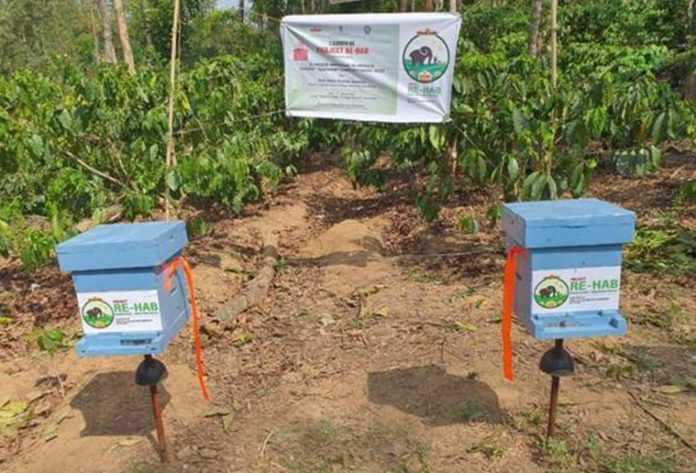New Delhi (NVI): Khadi and Village Industries Commission (KVIC) today launched a unique project of creating “bee-fences” to mitigate human- elephant conflicts in the country.
Project RE-HAB (Reducing Elephant – Human Attacks using Bees) is aimed at thwarting elephant attacks in human habitations using honey bees and thus reducing loss of lives of both, humans as well as elephants, the Ministry of Micro, Small & Medium Enterprises said.
The pilot project was launched at four locations around village Chelur in Kodagu district of Karnataka today by KVIC Chairman Vinai Kumar Saxena. These spots are located on the periphery of Nagarhole National Park and Tiger Reserve and prone to human-elephant conflicts. The total cost of the RE-HAB project is Rs 15 lakh, according to the Ministry.
Project RE-HAB is a sub-mission under KVIC’s National Honey Mission. While the Honey Mission is a programme to increase the bee population, honey production and beekeepers’ income by setting up apiaries, Project RE-HAB uses bee boxes as a fence to prevent the attack of elephants.
KVIC has set up 15-20 interspersed bee boxes at each of the four locationsin the passage ways of elephant-human conflict zones to block the entrance of elephants to human habitations. The boxes are connected with a string so that when elephants attempt to pass through, a tug or pull causes the bees to swarm the elephant herds and dissuade them from progressing further.
Bee boxes have been placed on the ground as well as hung from the trees to block the passage of elephants. High resolution, night vision cameras have been installed at strategic points to record the impact of bees on elephants and their behavior in these zones, the Ministry said.
KVIC Chairman VK Saxena called it a unique initiative and as a sustainable resolution to the human-elephant conflicts that are common in several parts of the country.
“It has been scientifically recorded that elephants are annoyed and even frightened of honey bees. Elephants fear that the bee swarms can bite their sensitive inner side of the trunk and eyes. The collective buzz of the bees is annoying to elephants and it forces them to return. Elephants, who are the most intelligent animal and carry their memories for long, avoid returning to the place where they have encountered honey bees,” he said.
Saxena also mentioned that “the biggest advantage of Project RE-HAB is that it dissuades elephants without causing any harm to them. Besides, it is extremely cost-effective as compared to various other measures like digging trenches or erecting fences”.
Nearly 500 people die every year due to elephant attacks in India. This is nearly 10 times more than the fatalities caused by big cats across the country. From 2015 to 2020, nearly 2500 people have lost their lives in elephant attacks. Out of this, nearly 170 human fatalities have been reported in Karnataka alone. On the contrary, nearly one-fifth of this number, i.e. around 500 elephants have also died in retaliation by humans in the last 5 years, as per the Ministry.
Earlier, Central Bee Research and Training Institute, Pune, which is a unit of KVIC, had conducted field trials of creating “bee-fences” in Maharashtra to mitigate elephant attacks. However, this is for the first time, KVIC has launched this project in totality.
KVIC has roped in the College of Forestry under the University of Agriculture and Horticultural Sciences, Ponnampet, for impact assessment of the project. KVIC Chief Advisor (Strategy & Sustainable Development) Dr R Sudarshana and Dr CG Kushalappa, Dean of the College of Forestry, were present on the occasion.
-ARK






